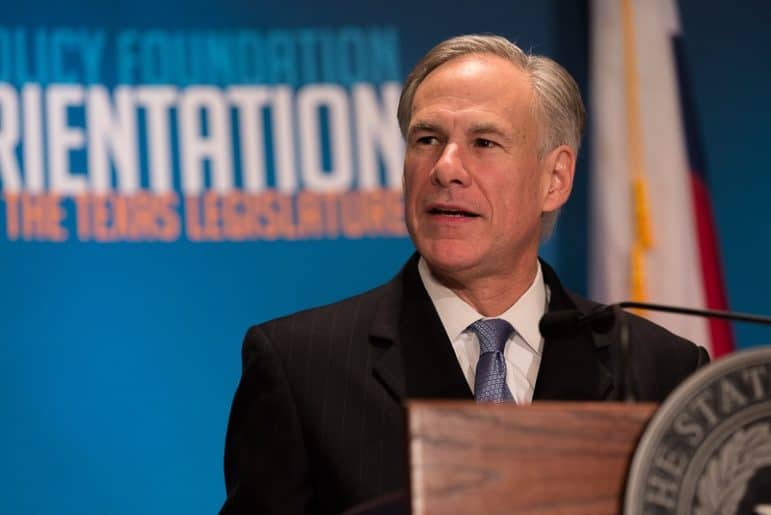
Shelby Knowles / The Texas Tribune
Greg Abbott gives the closing keynote at the 2016 Texas Public Policy Foundation Policy Orientation on Jan. 8, 2016.
Greg Abbott could’ve called it I’m Fed Up, Too!
The Texas governor unveiled Fed Up! 2.0 on Friday at the Texas Public Policy Foundation’s conference in Austin — calling on his fellow provincial leaders to assemble for a constitutional convention that would, as he sees it, empower the state governments and constrain the federal government.
Texans have been mad at the feds for a long, long time. Abbott’s sally is a sequel to then-Gov. Rick Perry’s federalist polemic in Fed Up! It fits into a continuum that traces back to the Tea Party and to the crowds of former Ross Perot Sr. supporters wearing “United We Stand” T-shirts at those early Tea Party rallies. It harkens back to efforts in the 1960s to amend the U.S. Constitution to thwart socially liberal decisions from the U.S. Supreme Court.
It’s another kind of sequel, too, setting Abbott in a line of Texas governors who became national political figures in one fashion or another. Ann Richards was a bona fide political celebrity, a leading liberal voice even though she never held national office. George W. Bush won two terms as president. Perry was a contender for president twice — losing his footing in the limelight in 2011 and then never quite finding his traction four years later. But he is undeniably a national figure.
Now Abbott wants to lead the states into a constitutional confrontation with the national government — a struggle that could put him in the center ring of U.S. politics whether he wins or loses.
The governor would like to add nine amendments to the U.S. Constitution. In his words:
- Prohibit Congress from regulating activity that occurs wholly within one state.
- Require Congress to balance its budget.
- Prohibit administrative agencies — and the unelected bureaucrats that staff them — from creating federal law.
- Prohibit administrative agencies — and the unelected bureaucrats that staff them — from pre-empting state law.
- Allow a two-thirds majority of the states to override a U.S. Supreme Court decision.
- Require a seven-justice supermajority vote for U.S. Supreme Court decisions that invalidate a democratically enacted law.
- Restore the balance of power between the federal and state governments by limiting the former to the powers expressly delegated to it in the Constitution.
- Give state officials the power to sue in federal court when federal officials overstep their bounds.
- Allow a two-thirds majority of the states to override a federal law or regulation.
The current popularity of federalism and state’s rights isn’t new, and Abbott was presenting his proposal to an audience that has already expressed an interest.
Perry’s 2010 book — Fed Up! Our Fight to Save America from Washington — was copyrighted by the Texas Public Policy Foundation. Abbott presented his idea at that group’s annual convention.
Perry’s acknowledgements in that book listed a bunch of advisers who are now in the Abbott circle, including political consultant Dave Carney and Daniel Hodge, Abbott’s chief of staff. Chip Roy, now the first assistant to Texas Attorney General Ken Paxton, was Perry’s ghostwriter.
You can’t fault Abbott’s timing, if sparking a national conversation is his goal. The Texas Republican primary is on March 1 — less than eight weeks from now — and the party’s nomination for president is unsettled. Those candidates will be pressed to talk about the idea of changing the Constitution, making the states stronger and making the federal government weaker.
They’re already talking. U.S. Sen. Ted Cruz of Texas told reporters in Iowa that he’s going to push for “quite a few” constitutional amendments if he’s elected president. He wasn’t working from Abbott’s list, but the idea of changing the nation’s charter is clearly on conservative minds. U.S. Sen. Marco Rubio of Florida was the first this year to float the idea of a constitutional convention. He is promoting term limits for judges and members of Congress and a budget-balancing amendment, too.
Previous efforts to add amendments like those have fallen short in the normal machinery of constitutional changes. Two-thirds of each house of Congress has to approve, and then the states choose whether to ratify; at least 38 of them have to go along or the amendment fails.
Presidential candidates can talk about it, but presidents don’t have much to do with whether there will be a convention. Abbott’s proposing to go another way, spelled out in the Constitution but never used: Two-thirds of the states can call a convention and push Congress out of the way.
The public would have to be stirred up. It would take some cajoling, some speechmaking and not a small amount of leadership — inside and outside the inner sanctums of politics and government.
Played with some skill and some luck, it’s the kind of project that could make a guy a national figure.
Disclosure: The Texas Public Policy Foundation has been a corporate sponsor of The Texas Tribune. A complete list of Tribune donors and sponsors can be viewed here.